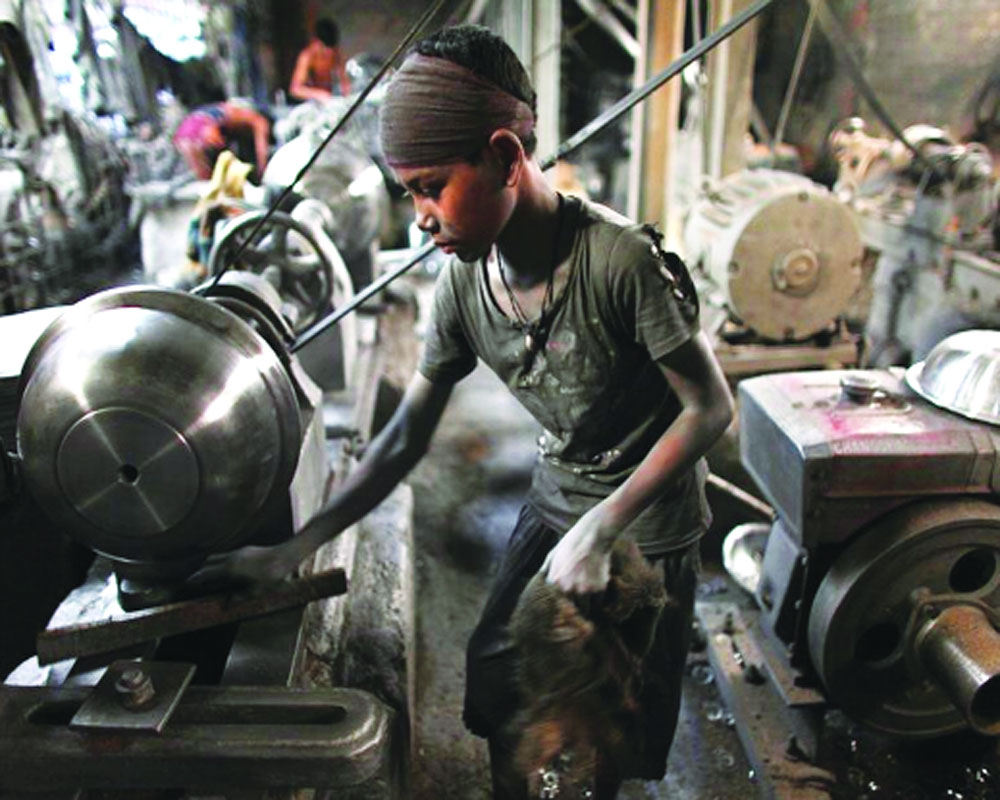Given the trans-national nature of trafficking, there is need for a comprehensive legislation that should factor in a well-equipped criminal justice system, a rehabilitative mechanism, ranging from the district to the national level, time-bound investigation, trial, rehabilitation and reintegration
Human trafficking is not a new crime, rather it is an age-old age practice prevalent in the form of “slavery” and was an accepted economic practice. Trafficking is nothing but “modern slavery” and has now emerged as a significant problem all over the world. The entire process of trafficking is a trans-national organised crime, starting from the identification of the victims, their transportation and lastly their exploitation, which operates seamlessly across national as well international borders.
Trafficking is a market-driven industry based on the principle of demand and supply. It is a demand-led crime wherein the victims are bought and sold for their exploitation and is one of the by-products of society’s unchecked greed and lust. It is an alarming fact that human trafficking is the only industry in which the supply always meets the demand. At this juncture it is imperative to understand the dynamics of ‘demand’ and ‘supply’ sides of trafficking. The organised gang of traffickers meets such demands by targetting areas and people with vulnerabilities. The supply pool is generally confined to areas with poor economic growth, high rate of gender disparity, political instability and lack of job opportunities. Reasons for the demand are countless, ranging from cheap labour to beggary, use of children for prostitution, sex tourism, pornography, forced prostitution, illegal organ trade and adoptions.
The victim most certainly is too undeveloped to give “consent” for “exploitation.” Sometimes the movement of children may be voluntary, wherein the victim is enticed or deceived by the trafficker; or as bonded labour where it is inter-generational; and sometimes involuntary where children are victims of coercion.
Babies are trafficked to boost the business of illegal adoption, widely known as “child laundering.” The child is procured illegally from his/her parents and the legal system of adoption is used to “launder” him/her as a legally adopted child. In 2018, a probe was carried out by the National Commission for Protection of Child Rights (NCPCR) which revealed that illegal adoptions were being carried out by the Missionaries of Charity in Ranchi, India. The home, by the name of Nirmal Hriday, was established for unwed mothers. It was found that the illegal adoption activities were going on there for the last several years. While the police traced the four children, who were sold by the home for adoption, 58 more suspicious cases came to light. In other words, in such rackets, a child is treated in a manner analogous to a criminal organisation engaged in money laundering, which obtains funds illegally but then “launders” them through a legitimate business as has been iterated in an article written by David M. Smolin.
Another frightening aspect of trafficking is exploitation of people, especially children, who are the victims of humanitarian crisis. According to BBC news, Shamim (name changed) aged 14, was forced to flee from her home country because of the fear of persecution for reasons of race, religion, ethnicity and so on. BBC news also reported that she fled from Myanmar after her family was killed. She was searching for help on the road to Bangladesh. In her own words, “Women came with a van. They asked me, if I’d go with them. After accepting their help, I was bundled into a car, with the promise of safe passage to a new life. Instead I was taken to the nearest city, Cox’s Bazar. Not long after that they brought two boys to me. They showed me a knife and punched me in my tummy and beat me because I wasn’t co-operating. Then the boys raped me. I wasn’t willing to but they kept going.”
It is unfortunate that despite the mounds of evidence, little is being done to stop preying traffickers. Neither is there any codified law or preventive measure to make the vulnerable people aware about the dynamics of trafficking, watching out for traps or the dark side of unsafe migration. Further, our legal system does not create adequate and effective deterrence against commercial exploitation of children; such deterrence is possible only when customers are dealt with sternly.
The existing enforcement mechanisms to curb the menace of trafficking are limited to punitive measures and a few schemes. They are grossly insufficient to address the multi-dimensional problems which trafficking poses. The present system is also grossly inadequate to meet the counselling, rehabilitation and reintegration needs of the victims of trafficking. Given its trans-national nature, there is a pressing need for a comprehensive legislation to deal with all aspects of trafficking, which should evolve a well-equipped criminal justice system and a rehabilitative mechanism, ranging from the district to the national level, to ensure prevention of trafficking, time-bound investigation, trial, rehabilitation and reintegration. There is also need for the “victim-witness protection protocol” to punish the perpetrators.
Against the above backdrop, in 2018, the Ministry of Women and Child Development introduced a comprehensive legislative framework — Trafficking of Persons (Prevention, Protection and Rehabilitation) Bill, 2018 — dealing with various aspects like preventives, time-bound prosecution and rehabilitation. For some reasons the Anti-Trafficking Bill, 2018 could not be passed and lapsed. However, the need for a comprehensive legislative framework still exists. Trafficking continues to be a severe attack on human dignity. At this point it is apt to refer to Martin Luther King who said, “Our lives begin to end the day we become silent about the things that matter.”
(The author is an Anti-Trafficking expert and a practising advocate in Delhi)


























